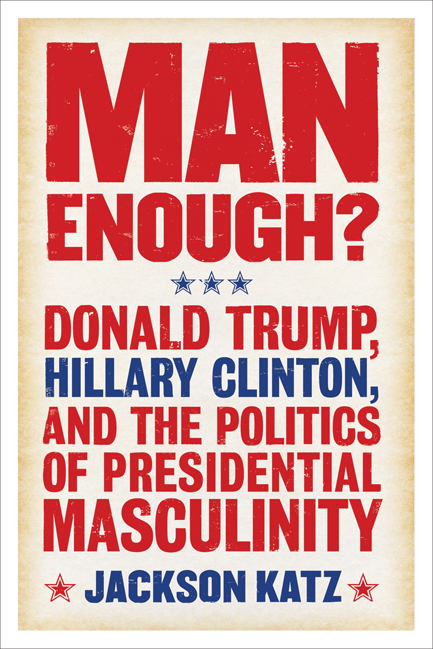Donald Trump and Issues of Masculinity
Jackson Katz is author of the book Man Enough? Hillary Clinton, Donald Trump and the Politics of Presidential Masculinity. Katz tells how Corey Lewandowski, Trump’s former campaign manager, has said that a major goal of Trump is “to ‘lock in the white guys,’ who are his core voters. Many commentators overlooked this incredibly revealing statement, choosing instead to focus on how his aggressive and uncompromising tone might have turned off swing voters and others.”
“From the start, Trump has positioned himself as the embodiment of tough-guy masculinity, a throwback to the days when men were men and America was great because of it. Cultural ideas about gender have always hovered beneath the surface of American presidential politics. But this time around, the combination of Hillary, a woman, facing Trump, the angry face of aggrieved and aggressive white manhood, has made gender, especially masculinity, visible in unprecedented ways.”
Katz highlights how “white men…[largely] changed their allegiance, broke up the New Deal coalition in the process, and created the gender gap we see to this day.
“A big factor was the decline of the labor movement. Organized labor was often seen as a source of blue-collar toughness and strength in its advocacy for the white working class. And I think some of the Democratic Party’s diminished strength with white working people can be traced to the decline of the labor movement as a traditional source of masculine strength. As blue collar manufacturing jobs have been shipped overseas, a lot of dislocated, alienated, and screwed-over white working-class guys have gravitated toward the tough-guy rhetoric and symbolism of the Republicans to hold on to their manhood. The Republican Party may offer working-class white men very little in terms of actual policies that benefit them, but at least they offer them a kind of cultural recognition and validation.”
Katz argues that part of the reason why there has been less attention to the gender aspects of white identity politics in this campaign is because of “an analytic blind spot, rooted in the fact that we’re not used to seeing dominant groups as ‘groups’ at all. For example, people often assume the word ‘race’ refers to people of color, rather than whites, who remain the privileged and often unexamined norm against which others are measured. Likewise when the subject of gender and politics comes up, the conversation typically turns to ‘women’s issues’ and the kind of things that motivate women voters. What’s mostly missing is any kind of sustained look at the male side of the gender gap, the material and symbolic factors that have driven men’s voting patterns over the years.”
See a recent interview with the Media Education Foundation.
For more information, contact at the Institute for Public Accuracy:
Sam Husseini | (202) 347-0020
David Zupan | (541) 484-9167
Jackson Katz | jackson@mvpstrat.com
@jacksontkatz

